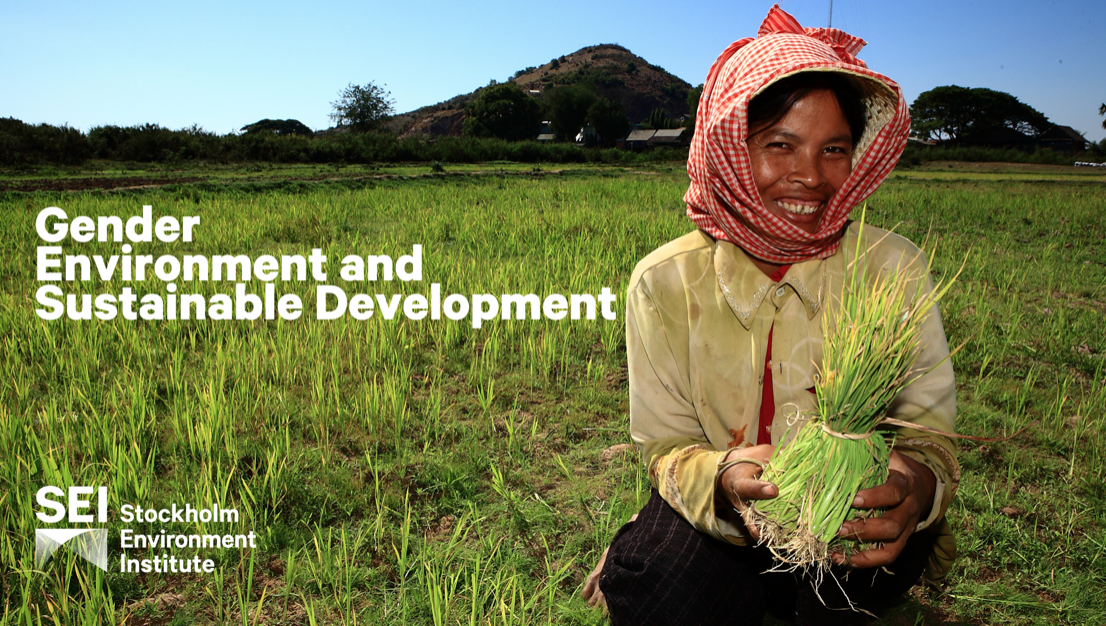Online course: Gender, environment and sustainable development

- Level: Advanced
- Time commitment: 4-5 hours per module (3 modules in total)
- Learning product:Online course (MOOC)
- Sector: gender, water, agriculture, climate change, disaster risk reduction
- Language:English
- Certificate available: certificateaccredited by SEI Asia Centre
Introduction
This online course from Stockholm Environment Institute (SEI) Asia Centre equips you with a set of multimedia and learning tools to better understand gender in environmental and sustainable development.
The course consists of three content modules. Firstly, the Introduction module will provide an explanation of the key issues and concepts about the gender and environment relationship with an explanation of the Feminist Political Ecology (FPE) framework. The second module, Gender in Agriculture and Water, will explore gender inequalities in agriculture and water management, and use an illustrative case study from the Mekong Region. Lastly, the module on Gender in Climate Change and Disaster Risk Reduction (DRR) will use the FPE perspective to explain the connections between gender, climate change and DRR along with a gender analysis of climate change adaptation and mitigation governance and a case study of the Nepal earthquake of April 2015.
To gain access to the Gender, Environment and Sustainable Development online course enroll here
Institutional background and trainer
The course has been developed by the Stockholm Environment Institute Asia Centre following many years of experience in gender issues related to the environment and development. Trainers include the team in the SEI Asia Centre led by Dr. Bernadette Resurreccion.
Guest speakers include Angela Lentisco (Independent researcher in gender and fisheries); DR. Clara Mi Young Park (Regional Gender Officer, Food and Agriculture Organization); DR. Kanokwan Manorom (Professor, Ubon Ratchathani University); Dr. Irene Dankelman (Professor, Centre for Sustainable Management of Resources, Radboud University); Dr. Rebecca Elmhirst (Researcher, University of Brighton) and Sangita Thebe Limbu (Gender, Development and Globalization at the London School of Economics).
For profiles of all the instructors, MOOC developers’ and guest speakers see here.
There is a Question and Answer article withHa Nguyen discussing the challenges in creating the online course and the context in Asia – see Making the complex engaging: an online course on gender and the environment.
Who would find this useful?
The MOOC targets professionals (researchers, policymakers, scientists, academics, and practitioners) specialised in the fields of environmental protection, climate change and sustainability who are interested in approaching and learning more about human rights aspects of their fields of work. The course is particularly suitable for environmental specialists with limited past experience and knowledge from the field of human rights. The MOOC aims to contribute to bridging the divide between experts in the fields of environment and human rights, to pursue synergies and improve the integration of human rights tools and considerations into environmental action and policy-making.
Training material
For each module 15-minute animation videos, short podcasts, key messages slides, reading materials, and quizzes (multiple choice) are available. These can be taken in your own time once registered onto the course. The course is divided into three Modules:
Module 1: Introduction
In this module, you will learn about:
- Gender inequality in environmental and natural resources management
- The gender-environment relationship in key sectors of natural resources management
- Ways to address gender inequality in policy decisions over natural resources
- Gender as a key variable of power inequality defining individuals’ experience of environmental and climate change
Module 2: Gender in agriculture and water
Through this module, you will:
- Learn how gender, in its intersection with other social and economic identities, shapes women’s and men’s control of, and their access to, water-related resources and how it mediates their experiences of the impacts of environmental change.
- Learn how local experiences in regard to the use of water resources, agriculture and environmental changes are influenced by broader political and economic policies.
- Learn about the causes of marginalization
- Learn how to address gender inequality in policy decisions over natural resources
Module 2: Gender in climate change and disaster risk reduction
In this module, you will learn about:
- Gender inequality in environmental and natural resources management
- The gender-environment relationship in key sectors of natural resources management
- Ways to address gender inequality in policy decisions over natural resources
- Gender as a key variable of power inequality defining individuals’ experience of environmental and climate change
Learning outcomes
The participants will learn:
- How gender, in its intersection with other social and economic identities, shapes control of women and men, and their access to natural resources, and mediates their experiences to the impacts of environmental and climate change
- The relationship between gender and the environment in key sectors of natural resources management
- How to address gender inequality in political decisions over natural resources
- How to implement gender-transformative approaches in climate change adaptation and mitigation governance
(0) Comments
There is no content